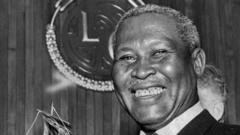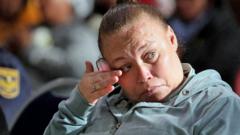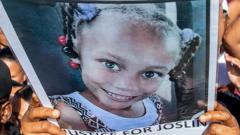Nearly six decades after Chief Albert Luthuli's death was ruled accidental, South African authorities are set to re-examine the case amid ongoing doubts about the circumstances leading to the tragedy, long viewed by many as a potential cover-up.
South Africa to Reinvestigate Nobel Laureate's Controversial Death

South Africa to Reinvestigate Nobel Laureate's Controversial Death
The country is set to reopen the inquest into Chief Albert Luthuli's death, a move welcomed by his family and activists questioning the original findings.
A South African court is preparing to review the enigmatic circumstances surrounding the death of Chief Albert Luthuli, a revered figure in the fight against apartheid and the recipient of the Nobel Peace Prize in 1960. Luthuli's demise in 1967 was ruled accidental by an inquest, claiming he was struck by a train while walking on railway tracks. However, his family and activists have long questioned this explanation, prompting the decision to reopen the investigation.
As the leader of the then-banned African National Congress (ANC) at the time of his death, Luthuli played a pivotal role in opposing the oppressive regime of apartheid. The ANC eventually succeeded in dismantling apartheid and assumed power in 1994, following South Africa's first democratic elections. The National Prosecuting Authority (NPA) has announced its intention to present new evidence to the court that may challenge the original inquest's findings regarding Luthuli's death, though specific details have not yet been revealed.
The previous inquiry concluded that there was no indication of criminal wrongdoing by railway employees or any other individuals, a determination that many, including Luthuli's grandson, Albert Mthunzi Luthuli, dispute. He expressed hope for the reopened inquest, despite the passage of time since the suspected complicity of various individuals involved in the case. “We believe the TRC [Truth and Reconciliation Commission] let many families down,” he stated, alluding to the post-apartheid process that offered amnesty to many perpetrators of violence at the time.
At the time of his death, Luthuli was restricted in both his movements and political participation due to the oppressive laws of the apartheid regime. He remains a historical figure of significance not only as the first South African Nobel Peace Prize winner but also as a key figure in the country's fight for equality. His legacy is shared with other Nobel laureates from South Africa, including Archbishop Desmond Tutu and Nelson Mandela.
Luthuli's case is just one of two significant inquests into the deaths of anti-apartheid activists being reopened. The second pertains to lawyer Mlungisi Griffiths Mxenge, who was brutally murdered in 1981, with prior inquiries failing to bring his killers to justice. The justice ministry indicated that new evidence necessitated the revival of Mxenge’s inquest, highlighting the ongoing process of seeking truth and accountability in South Africa's contentious past.
Through these renewed investigations, South Africa continues to grapple with the haunting impacts of apartheid, striving to uncover historical injustices and provide closure to the families of those who fought against systemic oppression.





















